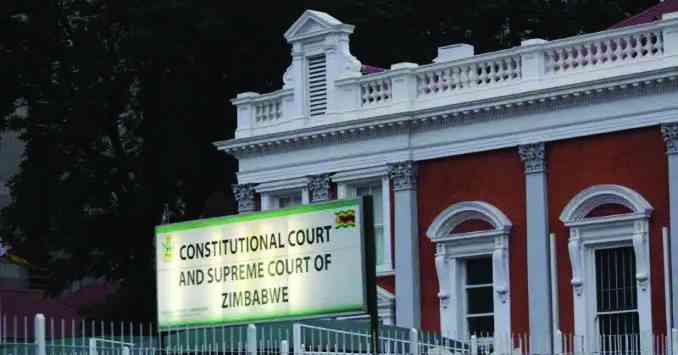
THE topic for this week’s installment sounds like a truistic proposition that is self-evident and says nothing beyond what is implied.
Before you dismiss it as a dull obvious truth that says nothing new or interesting, let me make a bold claim.
The statement is loaded and speaks to the very sacrosanct idea of electoral democracy anchored on universal adult suffrage.
In the past, I have written generally about electoral politics.
This week I find it apt to qualify the electoral politics within the frame of electoral democracy.
Electoral democracy places in its centrality, the right of citizens to choose their public representatives through the ballot. Zimbabwe’s constitution (Section 67) accords political rights to citizens, the right to participate in elections as voters and candidates, and, if elected, to occupy public office.
This right seems to have been assaulted in recent weeks following the candidate nomination process.
Politricks through the courts
- Zim headed for a political dead heat in 2023
- Chamisa party defiant after ban
- Village Rhapsody: How Zimbabwe can improve governance
- News in depth: Partisan police force persecutes opposition, shields Zanu PF rogue elements
Keep Reading
There have been several cases brought before the courts to challenge the nomination of various candidates.
The two most intriguing petitions have been appealed all the way to the Supreme Court, and one has even gone up to the Constitutional Court.
I say intriguing, in political terms and not necessarily in legal terms or jurisprudence.
First it was one Lovedale Mangwana challenging the nomination of Saviour Kasukuwere on grounds that he has not been resident in his constituency for more than 18 months.
The second sought to nullify the nomination of Citizens Coalition for Change (CCC) and other opposition candidates in Bulawayo on grounds that they filed their nomination papers after the 4pm deadline.
It was a festival of cases in which 12 voters in Bulawayo challenged the nomination of 12 parliamentary candidates, in 12 separate cases and in 2 different courts simultaneously — in the Electoral Court and in the High Court. What mischief!
The High Court nullified their candidacy and triggered a few gruelling days. Bulawayo voters had been deprived of their right to choose their leaders.
In some constituencies, Zanu PF candidates would have been declared winners before a single vote was cast! The Supreme Court reversed and set aside the disqualification by the High Court and reinstated all 12 candidates.
It is trite to note that both these court applications did not challenge the substance of the nominated candidates but rather the technicalities surrounding their nomination. This is very problematic. I will get to it in a moment. Allow me to first deal with the liminal issue in the public domain especially on various social media platforms in which all and any opinion finds expression – whether informed or not.
Politics is not a church service
Politicians of all stock and conviction - or none — like to remind all of us, and each other that: ‘kupolitics akusi kuchurch’ (politics is not a church service).
This statement suggests that morals and ethics are applied with liberal abandon in political contests — sometimes never. While this phrase betrays a pervasively toxic political culture, it is an expression of realpolitik. It means that political opponents will identify and leverage any technical or substantive weaknesses in their opposite number and strike. In simple terms, Kasukuwere or CCC cannot appeal to the political morality of Zanu PF to desist from throwing such cheap tricks in the face of a crucial public process like elections.
I have often opined that the act of submitting nomination forms at the 11th hour by CCC was ill-advised.
Whether it was an ill-informed strategy or a result of ineptitude and organisational incompetence or both, is the subject for my private conversations with those I relate to in that camp.
All the same, the Nomination Court opened 10 days earlier and it is inexcusable that the party had to expose its flank and be entangled in these court challenges.
It is a classic case of schoolboy blunders that could have been easily avoided.
Unsurprisingly, Zanu PF swooped in to exploit that technicality and almost succeeded.
Subversion of democracy
The inadequacies of CCC aside, technicalities disqualifying candidates from standing for elections subvert democratic rights.
They are anathema to the very foundation of a republic where elections are an instrument to manufacture the consent of the governed. Candidates have the right to offer their services to the electorate, just as the electorate has the right to vote for their preferred candidate. I find it apt to rehash Arnold Tsunga’s question posed in his Newsday opinion piece addressing the same matter:
“… to what extent can the administrative or logistical errors or ineptitude or even incompetence of the party or administrator who is in substantial compliance with the nomination process be a basis to disqualify a candidate and deprive the voters of the right to choose their leaders?”
Such a fundamental right at the centre of democracy cannot be justifiably infringed by technicalities. Of course, candidates cannot be given free reign. The right to stand for elections should only be limited by circumstances that seriously affect the candidate’s ability to serve the electorate.
This is justifiable in instances where one is of unsound mind, has a criminal record or is bankrupt. These are unquestionably legitimate grounds for disqualification.
Chief Justice Malaba concurs
Even the Constitutional Court recognised and upheld the importance of giving weight to substance and not technicalities on important matters of public interest.
The Chief Justice, during the presidential election petition in 2018 stated that, “…due to the importance of the matter and the public interest, the Court has the power to condone the non-compliance with the Rules in the interests of justice.”
I would aver that an election falls within the same ambit of importance and public interest. As such, the Zimbabwe Electoral Commission must have the power to condone or remedy technical inadequacies in the interests of administering a free, fair and credible election, provided that such condonation does not reasonably infringe on anyone’s electoral rights.
Court applications anchored on technicalities must be handled with due care and objectivity so that they do not reinforce weaponisation of procedural technicalities to exclude opponents.
The bigger point here is that legality is not equal to legitimacy. Zanu PF would have won the legality argument — as it did at the High Court — but it had fatally lost the legitimacy one.
Had the Supreme Court not re-instated the 12 candidates in Bulawayo, that election would have gone down history as a monumental sham!
Administrative conveniences
Technicalities are an important part in any process as they provide guardrails against abuse of process and enhance procedural efficiency. Technicalities cannot and should not be an end in themselves outside of the broader constitutional rights within a democratic society.
They are a procedural framework to facilitate the process and provide administrative convenience for the smooth running of the nomination process, not to disqualify candidates. It would be a travesty of justice if Zec’s powers and authority to condone or remedy technical inadequacies in the conduct of elections is usurped by the courts.
Granted, the inadequacies must not infringe on any other candidate or voter’s rights. A critical question is, whose rights are violated by the late submission of nomination forms? More-so when the forms are still submitted within the same day.
None
It is indeed an administrative inconvenience to Zec but if the commission condones or remedies it without fatally disadvantaging anyone, and in service to a free, fair, and credible election, then it is justifiable.
Zec should be commended for that conduct, which enhances the legitimacy of the election. Democracy should not be trivialised to pedantic hair-splitting over small technical points of procedure to disenfranchise candidates and voters.
Technicalities of no material significance in judging whether a candidate is fit to run for office must not dent the credibility of a whole election. Especially one in which the ‘second republic’ casts as a showy display of its reform plumes - desperately.
The sober view
Ultimately, the important role of the courts in electoral disputes adjudication cannot be ignored or undermined.
However, in doing so, the judiciary must not be seen as an overbearing institution towering on the administration of the election.
They must walk a tight rope to still be guarantors of electoral justice but must never become the elections administration institution themselves.
The weaponisation of the courts to deal with political opponents in an election heralds a sad day for democracy and must never be condoned, let alone celebrated.
If left unchecked, this culture will see a race to the bottom as candidates look for parochial means to disqualify their opponents on flimsy technicalities. Otherwise, what would be the point for the ballot if the courts can, in the stroke of a pen and fall of a gavel determine the losers of an election even before any ballot is cast?
This would have been an unfortunate precedence replacing the sanctity of the vote with the sovereignty of the courts.
Both are important in an election.
And both must be exercised within the spirit of enhancing and not undermining the credibility of the election.
The central point here is that it is Zec administers elections, not the judiciary.
As such, elections must be won and lost at the ballot, not at the courts.
This is my sober view; I take no prisoners.
- Dumani is an independent political analyst. He writes in his personal capacity. — Twitter: @NtandoDumani






